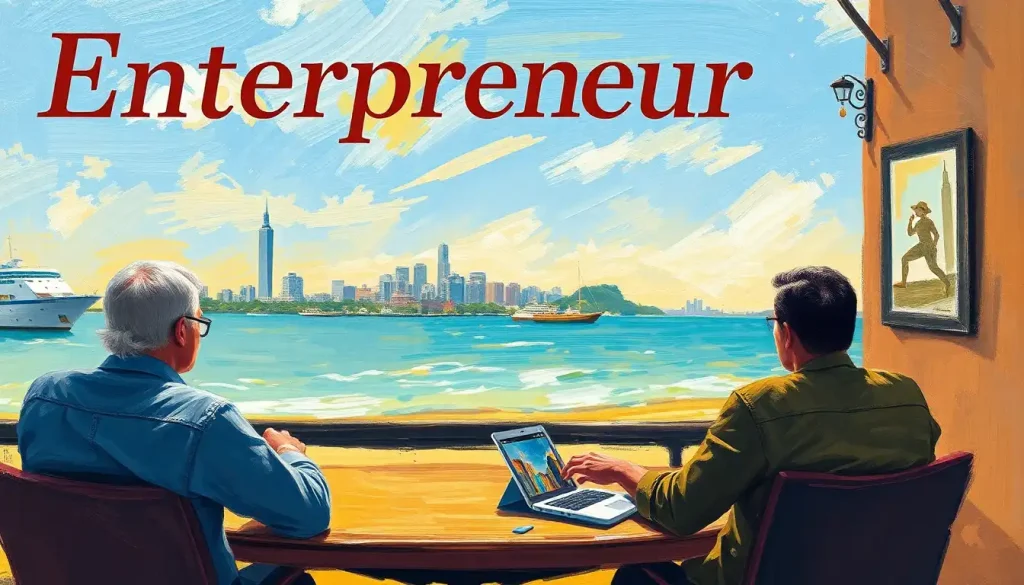Picture a boardroom full of seasoned executives eagerly scribbling notes as they learn to think like nimble startup founders – this is the new frontier of business leadership. Gone are the days when corporate bigwigs could rest on their laurels, content with their tried-and-true methods. Today’s business landscape demands a fresh approach, one that blends the wisdom of experience with the audacity of entrepreneurial spirit.
But what exactly is this magical fusion of executive education and entrepreneurship? Well, buckle up, because we’re about to embark on a thrilling journey through the world of business innovation and leadership transformation.
Executive education, in its essence, is like a turbo boost for seasoned professionals. It’s not your run-of-the-mill MBA program; instead, it’s a targeted approach to leveling up specific skills and knowledge. Now, imagine injecting that with a healthy dose of entrepreneurial moxie, and you’ve got yourself a potent cocktail for success.
Why the sudden clamor for entrepreneurial skills in the corporate world, you ask? Well, let’s face it – the business landscape is changing faster than you can say “disruptive innovation.” Companies that once seemed invincible are now being outmaneuvered by scrappy startups with a fraction of their resources. It’s like watching David take on Goliath, but with smartphones and AI instead of slings and stones.
The Power Couple: Executive Education and Entrepreneurship
Combining executive education with entrepreneurship training is like giving Superman a jetpack – it’s taking something already powerful and making it unstoppable. This dynamic duo offers a smorgasbord of benefits that can transform even the most set-in-their-ways executives into agile, forward-thinking leaders.
For starters, it breathes new life into stagnant thinking patterns. You know that guy in every office who starts every sentence with “But we’ve always done it this way”? Yeah, this combo is his kryptonite. It challenges executives to question the status quo, embrace uncertainty, and view failure not as a career-ender, but as a stepping stone to success.
Moreover, it equips leaders with the tools to navigate the choppy waters of rapid technological change. In a world where AI can write poetry and cars can drive themselves, staying ahead of the curve isn’t just an advantage – it’s a necessity. Entrepreneurship Curriculum: Designing Effective Lessons for Future Business Leaders plays a crucial role in shaping this mindset.
The Secret Sauce: Key Ingredients of Entrepreneurial Executive Education
So, what’s in this magical elixir that turns corporate suits into startup savants? Let’s peek into the cauldron and see what’s brewing.
First up, we’ve got innovation and creativity modules. These aren’t your grandma’s brainstorming sessions. We’re talking about cutting-edge techniques that make “thinking outside the box” look like child’s play. Executives learn to tap into their inner mad scientist, conjuring up ideas that would make even Elon Musk do a double-take.
Next on the menu is strategic thinking and decision-making. In the startup world, decisions need to be made faster than you can say “pivot.” These modules teach executives to make smart choices on the fly, balancing gut instinct with data-driven insights.
Leadership and team management in startup environments is another crucial component. It’s one thing to lead a well-oiled corporate machine, but quite another to inspire a ragtag group of sleep-deprived innovators fueled by nothing but caffeine and dreams. These courses teach the art of motivating diverse teams and fostering a culture of innovation.
Financial management and fundraising strategies are also key. After all, even the most brilliant idea won’t get off the ground without some cold, hard cash. Executives learn the ins and outs of startup financing, from bootstrapping to venture capital pitches that would make a shark tank look like a kiddie pool.
Last but not least, there’s digital transformation and technology adoption. In today’s world, if you’re not tech-savvy, you’re practically a dinosaur. These modules ensure executives can hold their own in conversations about blockchain, machine learning, and whatever the next big tech buzzword might be.
The Crème de la Crème: Top Executive Education Programs in Entrepreneurship
Now that we’ve whetted your appetite, let’s take a look at some of the top-notch programs that are turning executives into entrepreneurial powerhouses.
Harvard Business School’s Executive Education in Entrepreneurship is like the Rolls Royce of these programs. It’s prestigious, it’s comprehensive, and it comes with a price tag that might make your CFO wince. But hey, you can’t put a price on transformation, right? Harvard Business School Entrepreneurship: Cultivating Future Business Leaders offers insights into this renowned program.
Not to be outdone, Stanford Graduate School of Business’ Executive Program in Innovation and Entrepreneurship is like the Tesla of the bunch – sleek, cutting-edge, and with a distinctly Silicon Valley flavor. It’s perfect for those who want to rub shoulders with tech titans and dream in binary.
INSEAD’s Executive Education in Entrepreneurship brings a global perspective to the table. It’s like the United Nations of entrepreneurship programs, bringing together diverse viewpoints and experiences from around the world.
MIT Sloan School of Management’s Entrepreneurship Development Program is the mad scientist of the group. It’s all about pushing boundaries and exploring the bleeding edge of innovation. If you’ve ever dreamed of creating the next big disruptive technology, this might be your jam.
These programs vary in structure, duration, and outcomes, but they all share one thing in common – they’re not for the faint of heart. They’re intense, they’re challenging, and they’ll push you out of your comfort zone faster than you can say “disruptive innovation.”
From Boardroom to Startup: Success Stories
Now, you might be thinking, “Sure, this all sounds great on paper, but does it actually work?” Well, buckle up, buttercup, because we’re about to dive into some real-life success stories that’ll make your head spin.
Take Jane, for example. She was a high-flying executive at a Fortune 500 company, but she felt something was missing. After completing an executive education program in entrepreneurship, she took the plunge and launched her own tech startup. Today, her company is revolutionizing the way we think about renewable energy, and she’s having the time of her life.
Or consider Tom, a middle manager who always had a passion for sustainable fashion. After his executive education experience, he not only launched his own eco-friendly clothing line but also implemented sustainable practices in his corporate role, leading to significant cost savings and positive PR for his company.
These success stories aren’t just about launching new ventures. Many executives find that their newfound entrepreneurial skills dramatically improve their performance in their current roles. They become better at identifying market opportunities, assessing risks, and driving innovation within their organizations.
Moreover, the global entrepreneurial mindset fostered by these programs is invaluable in today’s interconnected business world. Executives learn to think beyond geographical boundaries, identifying opportunities and navigating challenges on a global scale.
Perhaps one of the most underrated benefits of these programs is the network they provide. When you’re rubbing shoulders with other ambitious, forward-thinking executives and entrepreneurs, magic happens. Partnerships are formed, ideas are exchanged, and sometimes, lifelong friendships are forged. It’s like LinkedIn, but with more coffee and late-night brainstorming sessions.
The Road Less Traveled: Challenges and Considerations
Now, before you rush off to enroll in the nearest executive education program, let’s take a moment to consider some of the challenges you might face on this entrepreneurial journey.
First off, there’s the age-old struggle of balancing theory with practice. While it’s great to learn about the latest business theories and models, the real test comes when you try to apply them in the real world. It’s like learning to ride a bike – no matter how many books you read about it, you’re probably still going to fall a few times before you get the hang of it.
Then there’s the challenge of addressing the diverse needs of executives from different industries. What works for a tech startup might not apply to a manufacturing company, and vice versa. The best programs find ways to offer personalized learning experiences that cater to each participant’s unique background and goals.
Keeping the curriculum up-to-date is another Herculean task. In a world where business trends change faster than fashion fads, staying current is crucial. Programs need to constantly evolve to reflect the latest developments in technology, market trends, and business practices.
Measuring the ROI of executive education in entrepreneurship can also be tricky. Unlike traditional business metrics, the benefits of entrepreneurial thinking aren’t always immediately quantifiable. How do you put a price tag on increased innovation or improved problem-solving skills?
And let’s not forget the elephant in the room – time. Most executives are already juggling more balls than a circus performer. Adding intensive education to the mix can be like trying to solve a Rubik’s cube while riding a unicycle – challenging, to say the least. Executive MBA in Entrepreneurship: Accelerating Your Business Leadership Journey offers insights into balancing education with a busy career.
The Crystal Ball: Future Trends in Executive Entrepreneurship Education
So, what does the future hold for executive education in entrepreneurship? Let’s dust off our crystal ball and take a peek, shall we?
First up, we’re likely to see a greater integration of AI and machine learning in entrepreneurship curricula. Imagine AI-powered simulations that allow executives to test their business ideas in virtual markets, or machine learning algorithms that provide personalized learning recommendations. It’s like having a super-smart robot as your study buddy.
There’s also a growing focus on sustainable and social entrepreneurship. As the world grapples with challenges like climate change and inequality, executives are increasingly looking for ways to do well by doing good. Future programs might include modules on creating sustainable business models or measuring social impact alongside financial returns.
Global markets and cross-cultural competencies are set to become even more important. In an increasingly interconnected world, the ability to navigate different cultural contexts and identify global opportunities is crucial. Future programs might include virtual reality experiences that transport executives to different markets around the world.
Personalized learning paths and modular program structures are also on the horizon. One-size-fits-all approaches are becoming a thing of the past. Future programs might offer a menu of modules that executives can mix and match based on their individual needs and goals.
Finally, we’re likely to see increased collaboration between academic institutions and industry leaders. Imagine learning about AI from a Silicon Valley tech guru, or discussing sustainable business practices with the CEO of a leading green energy company. It’s like bringing the mountain to Mohammed, but with more PowerPoint presentations.
The Final Frontier: Embracing the Entrepreneurial Mindset
As we wrap up our whirlwind tour of executive education in entrepreneurship, let’s take a moment to reflect on the transformative power of this approach. It’s not just about learning new skills or theories – it’s about fundamentally changing the way you think about business and innovation.
By combining the strategic acumen of seasoned executives with the agility and creativity of entrepreneurs, we’re creating a new breed of business leaders. These are leaders who are equally comfortable in the boardroom and the startup garage, who can navigate corporate bureaucracies and pivot on a dime.
So, to all you executives out there, I say this: don’t be afraid to embrace your inner entrepreneur. Take the plunge into entrepreneurship-focused education. Challenge yourself. Push your boundaries. Who knows? You might just be the next big disruptor in your industry.
As we look to the future, one thing is clear – the line between executive and entrepreneur is blurring. In this brave new world of business, the most successful leaders will be those who can seamlessly blend both roles, driving innovation and growth in organizations of all sizes.
So, are you ready to join the ranks of these entrepreneurial executives? The boardroom of the future is waiting, and it’s got your name on it. Just don’t forget to bring your innovative spirit and a healthy appetite for disruption. After all, in the words of the great Steve Jobs, “The people who are crazy enough to think they can change the world are the ones who do.”
References
1. Kuratko, D. F. (2005). The emergence of entrepreneurship education: Development, trends, and challenges. Entrepreneurship Theory and Practice, 29(5), 577-597.
2. Neck, H. M., & Greene, P. G. (2011). Entrepreneurship education: known worlds and new frontiers. Journal of Small Business Management, 49(1), 55-70.
3. Fayolle, A., Gailly, B., & Lassas-Clerc, N. (2006). Assessing the impact of entrepreneurship education programmes: a new methodology. Journal of European Industrial Training, 30(9), 701-720.
4. Peterman, N. E., & Kennedy, J. (2003). Enterprise education: Influencing students’ perceptions of entrepreneurship. Entrepreneurship Theory and Practice, 28(2), 129-144.
5. Rasmussen, E. A., & Sørheim, R. (2006). Action-based entrepreneurship education. Technovation, 26(2), 185-194.
6. Pittaway, L., & Cope, J. (2007). Entrepreneurship education: A systematic review of the evidence. International Small Business Journal, 25(5), 479-510.
7. Souitaris, V., Zerbinati, S., & Al-Laham, A. (2007). Do entrepreneurship programmes raise entrepreneurial intention of science and engineering students? The effect of learning, inspiration and resources. Journal of Business Venturing, 22(4), 566-591.
8. Nabi, G., Liñán, F., Fayolle, A., Krueger, N., & Walmsley, A. (2017). The impact of entrepreneurship education in higher education: A systematic review and research agenda. Academy of Management Learning & Education, 16(2), 277-299.
9. Fayolle, A., & Gailly, B. (2015). The impact of entrepreneurship education on entrepreneurial attitudes and intention: Hysteresis and persistence. Journal of Small Business Management, 53(1), 75-93.
10. Lackéus, M. (2015). Entrepreneurship in education: What, why, when, how. Background paper for OECD-LEED. Available at: https://www.oecd.org/cfe/leed/BGP_Entrepreneurship-in-Education.pdf












Would you like to add any comments? (optional)